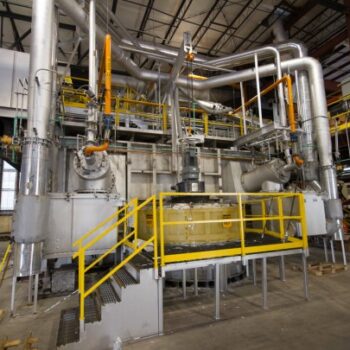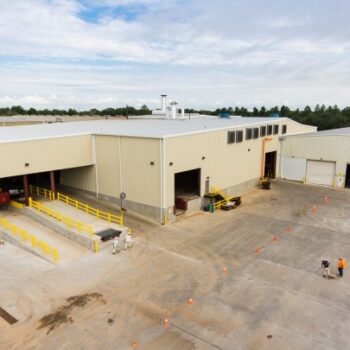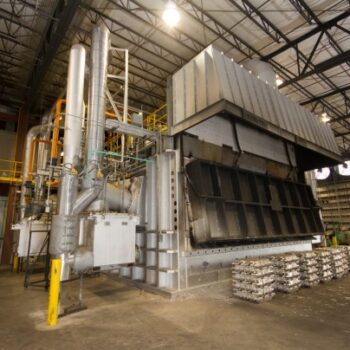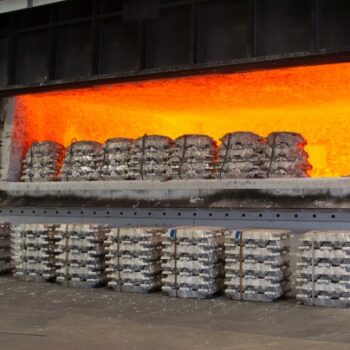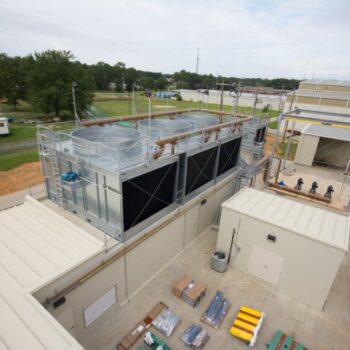Vulcan, Inc. is an employee-owned company located on the Alabama Gulf Coast in Foley. The firm operates one of the only completely vertically-integrated aluminum processing plants in the country, in which raw aluminum bars are heated into a molten form, and then rolled into coils. Vulcan cuts the product to the specified length, and manufactures a variety of finished goods. Notably, the Foley plant produces fully 60% of the street signs installed annually in the United States.
Vulcan was founded in 1966 as a traffic sign and metal stampings company in Birmingham, Alabama. The company grew steadily in the ensuing decades, ultimately relocating its entire production operation and corporate headquarters to Foley. In 1986, the company constructed a state-of-the-art aluminum rolling mill, enabling it to produce aluminum coil and sheet for the signage industry, among other customers. A facility expansion was completed in 1997, doubling the size of the sign manufacturing plant. The late 1990s also witnessed the dedication of a new Technology Center to house employee training facilities, as well as Vulcan Traffic Management Services, the firm’s in-house software development division. Another expansion resulted in the addition of slitting, annealing and processing capabilities to the aluminum rolling mill. Most recently, Vulcan completed a multi-million dollar upgrade and modernization of the rolling mill, to incorporate new technology permitting the electromagnetic pumping of molten aluminum.
The region surrounding the location of the Foley, Alabama plant struggles with a 20.9% poverty rate, with correspondingly high rates of unemployment and underemployment. However, the state’s leadership has in recent decades succeeded in attracting more and more high profile industrial investment, bringing for the first time living wage manufacturing jobs to corners of Alabama that have long struggled with severe disinvestment and little opportunity.
The state has lavished incentives upon multinational companies like Mercedes Benz, Hyundai, Airbus, and ThyssenKrupp, betting that their attention-grabbing investments will attract smaller, yet far more numerous investments in industries located upstream and downstream from the goods produced by these companies. It is understood that these big-name investments, while attention-grabbing, cannot on their own break the cycle of poverty and remedy the longstanding deficit of opportunity experienced by so many Alabamans.
Vulcan Inc., located within a rural, low income census tract, successfully weathered the Great Recession and is now in growth mode, undertaking a $17 million expansion to its manufacturing plant. In September, 2013, Crescent Growth Capital worked with Vulcan, Capital One Bank, Hampton Roads Ventures and MuniStrategies to structure and close a “stacked” $22.5 million Federal/$10 million Alabama State QEI to fund the continued expansion of its Plant 6, effectively doubling the company’s hot-rolled aluminum manufacturing.
The Vulcan plant expansion epitomizes the ancillary investment that Alabama seeks. Thanks to the $5.66 million in net Federal and State subsidies, Vulcan is able to expand and refine its operations to maintain its position as the Nation’s largest producer of aluminum street signs, while adding quality jobs in a high poverty, high unemployment region. At least 200 construction workers will be employed in the course of this expansion. When completed, the expanded Plant 6 will employ an additional 60 full-time employees, the majority of whom will be new production line workers with an average wage of $15.00 per hour. Vulcan will also be adding employees to its sales and supervisory staff.

